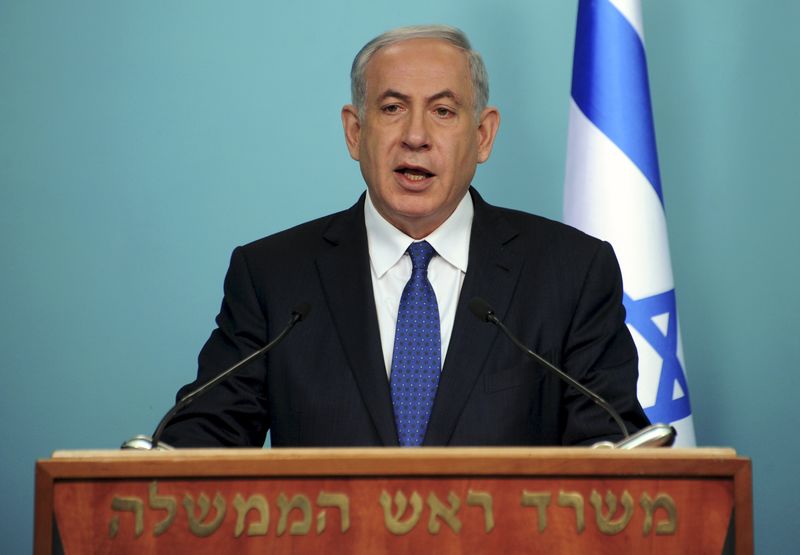By Doina Chiacu
WASHINGTON (Reuters) - Israeli Prime Minister Benjamin Netanyahu urged the United States on Sunday to seek a better deal to curb Iran's nuclear program and said he would press American lawmakers not to give Tehran "a free path to the bomb."
President Barack Obama, hoping to sway skeptics at home and abroad to get behind the framework agreement struck on Thursday between world powers and Iran, defended the deal as the best hope to prevent Tehran from acquiring a nuclear weapon.
Obama, whose relations with Netanyahu have frayed badly over the Iran issue, sought to assure Israelis he understands their concerns. They should know "there is no formula, there is no option, to prevent Iran from getting a nuclear weapon that will be more effective than the diplomatic initiative and framework that we put forward - and that's demonstrable," he said in an interview with The New York Times published on Sunday. (http://nyti.ms/1IhMLSS)
The Israeli prime minister has been strongly critical of the deal struck on Thursday in Switzerland, saying it threatens the survival of Israel. Netanyahu said he has spoken with both Democrats and Republicans in Congress - nearly two thirds of House of Representatives members and a similar number in the U.S. Senate - about the Iran nuclear issue.
In appearances on U.S. television on Sunday, Netanyahu did not repeat his assertion on Friday that any final agreement should include a commitment by Iran recognizing Israel's right to exist.
But, speaking on CNN's "State of the Union" program, he said of the deal, "This is not a partisan issue. This is not solely an Israeli issue. This is a world issue because everyone is going to be threatened by the pre-eminent terrorist state of our time, keeping the infrastructure to produce not one nuclear bomb but many, many nuclear bombs down the line."
Netanyahu angered the White House and alienated some of Obama's Democrats when he accepted a Republican invitation to address Congress and speak out against the looming agreement on March 3, two weeks before the Israeli elections that returned him to office.
Netanyahu denied he was coordinating with House of Representatives Speaker John Boehner, who visited Israel last week, and with other Republicans to block the Iran deal.
But he denounced the framework agreement between Iran and the United States, Britain, France, Germany, China and Russia, saying, "There's still time to get a better deal and apply pressure to Iran to roll back its nuclear program."
Israel, which is believed to be the only nuclear-armed state in the Middle East, says it believes Iran is committed to its destruction.
LEGISLATION IN THE WORKS
Obama told Netanyahu in a telephone call soon after the deal was reached that it represented progress toward a lasting solution that cuts off Iran's path to a nuclear weapon. Iran has long maintained that its nuclear program is purely for peaceful purposes.
Republicans, who control both chambers in Congress, and some Democrats are preparing legislation that would entail a vote in Congress on any Iran deal. Senator Bob Corker, the Republican chairman of the Senate Foreign Relations Committee, said he was waiting to learn more details about the framework agreement.
"I don't know how someone can ascertain whether this is something good or bad," he said on "Fox News Sunday."
Obama has said he would veto legislation demanding an up-or-down vote in Congress on any final deal worked out with Iran by the deadline of the end of June that has been agreed by Iran and the six powers.
Corker said it was unclear whether opponents of the deal would be able to muster the votes to override such a veto.
Netanyahu said he had an hourlong conversation with Obama. Asked on CNN if he trusted Obama, Netanyahu said he was sure the president was doing what he thought was good for his country, but they disagreed about the best policy on Iran.
In his interview with New York Times columnist Thomas Friedman, Obama sought to assure Israel of firm U.S. support.
"Not only am I absolutely committed to making sure that they maintain their qualitative military edge, and that they can deter any potential future attacks, but what I'm willing to do is to make the kinds of commitments that would give everybody in the neighborhood, including Iran, a clarity that if Israel were to be attacked by any state, that we would stand by them."
He said he was troubled by being perceived as less than supportive of Israel, telling Friedman, "It has been personally difficult for me to hear ... expressions that somehow ... this administration has not done everything it could to look out for Israel's interest."

While he was upbeat about the nuclear deal, Obama said the issue was not the only division between Washington and Tehran. The nuclear deal should be a single issue, and the United States at the same time wanted to send "a clear message to the Iranians that you have to change your behavior more broadly and that we are going to protect our allies if you continue to engage in destabilizing aggressive activity," Obama said.